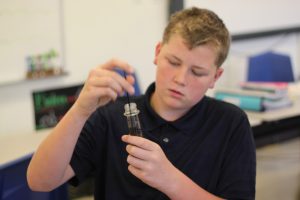 As parents of middle school age students, you know well that your children learn angles, algebra, and vectors by day; and display anger, aggression, and victimization at night.
As parents of middle school age students, you know well that your children learn angles, algebra, and vectors by day; and display anger, aggression, and victimization at night.
This is a time of contrasts. However, we can make this period go much more smoothly.
Here are the facts: your preteen and teenager’s brain has not developed the thinking, rational part of their brain yet and worse, their emotional part is not well connected with what rational part there is.
Yet, there is hope. Teaching critical thinking can help expedite the development of the rational part. Empathy can ensure your teenager continues appreciating you as a source of support.
Up until now, you have spent 10 plus years of your life loving, cleaning up after, fawning, and cherishing your children. You have loved them profoundly and wildly. While they never know the depths to which you adore them, it really does not matter, because you would do it anyway. And then comes puberty and—without warning or a grace period—those times are replaced by unpredictable, often ungrateful and reckless teenage behavior that seems almost willfully irrational. You are heartbroken. What happened?
It probably does not help to say that you went through this yourself. I did too. I know this to be true because humans by design must go through this. You see the brain develops slowly and, shall we say, inconveniently.
The first parts of the brain to develop are the ones essential for existence: the areas that automate breathing, heart rate, etc. The next area to develop is the region called the limbic system. This region is also referred to as the lizard brain because it is the part of the brain that cannot think the way humans do.
The last part of the brain to develop is the frontal lobe. When humans become teenagers, their frontal lobe is only about 80 percent developed. The remaining 20 percent will complete by the time they are 20 years old. Worse yet, the connections between the neurons are not developed. So, while the frontal lobe may be 80 percent developed, the connections to the lizard brain may remain few.
Fortunately, the brain is pliable and responsive. Despite teenagers’ underdeveloped rational portion of their brain, with concerted effort, the rational portion can actually grow and improve!
How so? By participating in critical thinking. Parents and teachers should engage with teenagers in critical thinking often. Critical thinking is a type of analytical thinking which involves understanding not only what is going on but why it is so. It is more than remembering and repeating. It is examining, evaluating, problem-solving, taking apart and putting back together.
Parents can do this with their teenagers by getting them to think about the cause and effect of future events. You can ask them:
- How are things related?
- What do you think that person was thinking?
- What if you do X, what would happen? What if you did Y?
- What is your goal? What would be helpful behaviors? What would be unhelpful behaviors and why? That last question is very important!
- What do you think things are like from this person’s point of view? How would you describe your perspective to someone else?
Ask these questions when there is nothing at stake; when you and your teenager are not arguing about using the car or buying those designer jeans. Basically, have this conversation at a time when the situation does not evoke strong emotions. It is also important to be empathetic during your discussions. Remember, you are dealing with teenagers and their underdeveloped brains.
Parenting at this stage is different than parenting younger children. Teenagers are beginning to become independent, and your job at this stage is to teach them how to do so. It is similar to teaching a child to ride a bike. They are going to fall. They are going to make mistakes, crash, and hurt themselves. They are not going to know what they are doing nor even how to fix it. However, they will eventually get it. Until then, you will keep them going forward helping them with one hand, partly to let them know you are there and partly to steady them. Eventually though, you will have to let go, and things will be different for the rest of their lives.
Programs like Self Development Academy are helpful too. Self Development Academy recognizes that teenagers can improve their critical thinking by teaching them. The program starts in kindergarten, teaching logic and reasoning early on, to give children and teenagers a jump start. In middle school, teenagers learn errors in thinking (fallacies), formal logic (which is not taught until college) and philosophy.
A recent research study showed that nearly half of the millennials and teenagers received an ‘F’ in critical thinking. While neurological development is to blame, we can still accelerate the process of developing critical thinking. Parents and schools can engage teenagers in critical thinking tasks and assignments in low stakes settings. We can be patient and empathetic, understanding that millions of years of biological development have put our patience at a disadvantage. It is an uphill battle, but we can chip away at the mountain and turn Everest into a field where everyone can stand on equal footing.
Self Development Academy is now enrolling K-8 for the school year 2020-2021. For more information about programs at Self Development Academy and the location of each of the four campuses, please call (480) 641-2640.


1 comment
Interesting article, I will try and ask the kids some of those Qs over the Christmas.